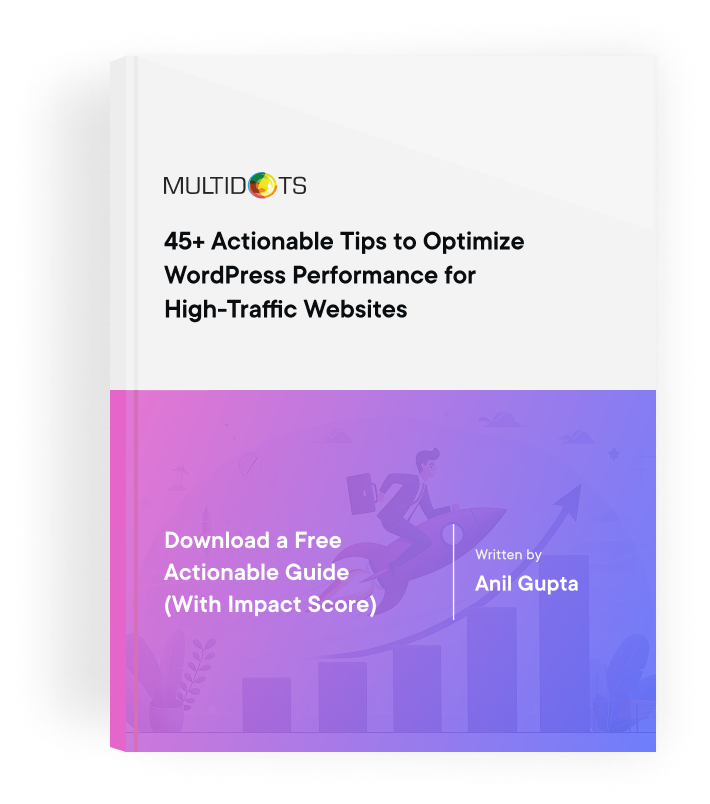Migrating A Website with 100k Pages From Sitecore to WordPress?
Essential strategies for migrating 100k pages website from Sitecore to WordPress without losing data or functionality

Table of Contents
WordPress is incredibly user-friendly and cost-effective, backed by an ever-evolving community support system. Its diverse plugin ecosystem allows you to extend functionalities effortlessly.
Moreover, its SEO-friendly nature and regular updates, along with a built-in blogging feature, make it a top pick for enterprises with Sitecore-hosted content-heavy websites looking to change things for the better.
However, migrating a Sitecore website with 100k pages, for instance, to WordPress is not as straightforward as pressing a button.
It comes with its own set of complexities, such as the need for intricate content mapping, SEO preservation, retaining custom functionalities, and even educating your team about the new platform. Let's not forget security concerns and the ever-daunting task of code cleanup.
Messing up any of these areas can result in severe consequences like cost overruns, stakeholder dissatisfaction, longer downtimes, or even data loss.
In this article, let's look at seven things you can do to minimize these risks and migrate your Sitecore website smoothly to WordPress
1. Understand the scope of your migration
Understanding the scope of your migration helps accurately assess the complexity of the project. When migrating from Sitecore to WordPress, you aren't just moving a couple of files. This migration involves:
- Content: This includes all your text, images, videos, and other media.
- Databases: Where all your website's structured data is stored.
- Modules: These are essentially Sitecore's plugins that add features to your website.
Migrating a website with 100k pages isn't a task to be taken lightly. The scale and depth involved in transferring this volume of content, databases, and modules demand a meticulous approach.
To better understand the scope of your project, you can:
- Create a detailed website content migration checklist.
- Inventory existing modules to evaluate their WordPress alternatives.
- Consult online communities like WordPress.org Support Forums for best practices.
- Leverage workshops such as Learn WordPress Online Workshops for insights about WordPress.
2. Audit your Sitecore website
Before beginning to transition from Sitecore to WordPress, conducting a pre-migration website audit is crucial. This involves taking a detailed inventory of your content, performing an SEO audit, mapping out existing functionalities, and documenting user roles.
It's like a health check-up for your website, giving you a complete picture of what you're working with.
This helps in identifying redundant content that you might not want to migrate, discovering dormant integrations that could be scrapped, ensuring data accuracy, and benchmarking current performance metrics.
This step can act as a risk mitigation strategy, where you can anticipate issues that could arise during the migration process and take preventive action.
Here are some quick steps to aid in your Sitecore website audit:
- Execute a complete content inventory.
- Use tools like Google Analytics for SEO audit.
- Document all user roles and permissions.
- Test and list all the third-party integrations.
3. Establish clear migration goals
Establishing clear goals while migrating your 100k-page website from Sitecore to WordPress ensures transparency across your team, allows for focused effort, and optimizes resource allocation.
Without well-defined goals, your migration might lack direction and could be prone to dangerous mistakes. You can divide your CMS transition objectives into two categories: tangible goals (quantitative) and intangible goals (qualitative).
Tangible goals include:
- Cost Savings with WordPress: Lowering operational and maintenance costs.
- Performance Improvement: Better site speed, and user engagement.
- Security Enhancements: More robust security features.
- Reduced Downtime: Minimal service disruptions during and post migration.
- SEO Gains and Mobile Responsiveness: Improved rankings and mobile usability.
Intangible goals could be along the lines of:
- Customer Experience: An intuitive and more navigable website.
- Stakeholder Confidence: Ensuring the migration builds trust among stakeholders.
- Brand Image: Realigning the website to represent your brand better.
- Team Productivity: Making website management easier for your internal team.
- Competitiveness: Staying ahead by enhancing your site quickly when needed.
- Compliance: Meeting all regulatory standards, including for search engines.
For enterprise websites, especially those with 100k pages, setting, achieving, and tracking these goals can be challenging for the in-house team.
Leveraging Sitecore to WordPress migration services from seasoned agencies can help you define these objectives based on your specific constraints like timeline and budget, ensure that you have a comprehensive checklist, and follow the best migration process.
4. Backup Data and Map Content Transfer
When you're migrating a large-scale website, especially one with 100k pages, backing up your Sitecore website data ensures risk mitigation, maintains data integrity, and helps retain operational continuity.
After backing up your website data, you need to map your site’s content which:
- Streamlines the content transfer
- Preserves content structure
- Facilitates SEO preservation
- Eases the transition for users
When you're migrating content from Sitecore to WordPress, content mapping essentially involves the one-to-one alignment of Sitecore pages to corresponding WordPress pages, categories, or tags.
This might sound simple, but with 100k pages, it becomes a complex part of your website migration checklist.
Content mapping ensures that each piece of content from the Sitecore website finds its appropriate new home in WordPress. This way, your content stays organized, and you'll have a more straightforward migration to WordPress from Sitecore from start to finish.
5. Have a Dedicated Migration Team
As you might have understood already, migrating a Sitecore website with 100k pages to WordPress is a complex project that demands precision and speed. Having a dedicated team of experts for this mammoth task is crucial.
A specialized team brings in the expertise, experience, and focus that is essential for ensuring a smooth and efficient migration process.
To help your migration team make informed decisions and tackle issues effectively throughout the Sitecore to WordPress migration process, keep them looped in on all aspects of the project in each of the phases and provide them with the necessary tools and documentation.
If assembling a dedicated in-house team isn't feasible, consider partnering with an experienced WordPress migration agency that offers specialized services that drastically reduce migration risks and timelines.
By having a dedicated migration team, whether in-house or through an agency, you can streamline the migrating from Sitecore to WordPress process and remain stress-free, setting yourself up for success from day one.
6. Test on a Staging Environment
A staging environment is a sandbox where you can test your new website without making it live or making changes to your older Sitecore website. It's a safety net that allows you to identify and resolve issues before they go live.
The importance of this can't be overstated, especially when you're migrating a behemoth like a 100k-page Sitecore website to WordPress.
In the staging environment, you can uncover a range of issues, such as broken links, UI/UX glitches, and database errors, that could otherwise go unnoticed until they become major problems. This step is pivotal in the entire Sitecore to WordPress migration process.
Here is a comprehensive checklist that will help you get started (feel free to expand on it as per your needs):
- Functionality Testing:
- Verify all website forms
- Check all CTAs and buttons
- Ensure correct data submission
- Security Testing:
- Check SSL certificate installation
- Run vulnerability scans
- Ensure secure data transfer protocols
- Core Web Vitals Testing:
- Evaluate page load speed
- Test visual stability
- Assess interactivity metrics
- Integrations Testing:
- Validate CRM integration
- Test email marketing software
- Confirm social media connections
- Compatibility Testing:
- Check browser compatibility
- Verify mobile responsiveness
- Assess operating system compatibility
7. Plan for Downtime and Post-Migration Tweaks
Let's face it, no migration is complete without some downtime. While migrating from Sitecore to WordPress, your website will be temporarily inaccessible. So, planning for this downtime is critical.
Choosing to migrate during your slow season minimizes the impact on your business but also gives you ample time to communicate with stakeholders. Early communication can manage expectations, reduce stress, and make room for collaborative solutions.
Post-migration tweaks are the norm, especially when you're dealing with a large-scale task like migrating from Sitecore to WordPress with 100k pages. Here are some common types of post-migration tweaks:
- URL redirects and SEO improvements
- Performance tuning and caching
- User access roles and permissions
- Content revisions and formatting
Since these tweaks are often inevitable, it's a good idea to keep some resources allocated for post-launch optimizations. You don't want to be caught off guard when a minor hiccup turns into a major headache, right?
By accounting for these elements, you are rounding out your Website migration checklist, ensuring that your migration is not just about moving from point A to point B, but also perfecting point B once you're there.
Wrapping Up
Phew, that was long!
We've covered the entire landscape of migrating a 100k-page website from Sitecore to WordPress. From understanding the scope of your migration to final post-migration tweaks, the aim has been to offer a comprehensive Sitecore to WordPress checklist for a smooth transition.
Whether you’re still considering migrating from Sitecore to WordPress or have already made up your mind, remember that meticulous planning, a dedicated team, and regular testing are your best allies. Ready to migrate your Sitecore website to WordPress? Contact Us today and let's turn this migration journey into a success story.
References
FAQs
-
The process begins with understanding the scope of your migration, followed by auditing your existing Sitecore website. Set clear goals and assemble a dedicated migration team. Backup your data, test in a staging environment, and then proceed with the actual migration. Post-migration tweaks are usually needed.
-
For large-scale migrations involving 100k pages or more, detailed planning is critical. Use tools to audit and map content from Sitecore to WordPress. We highly recommend engaging with experienced migration services for such voluminous transfers.
-
The time depends on various factors such as the diversity of your content, the expertise of your migration team, the number of users, etc. For instance, a 100k-page website could take anything between a few weeks to a couple of months.
-
Data backup is a crucial step before migration. You can use various plugins and tools for content mapping and data transfer. Make sure to test the data in a staging environment before making the final move.
Feel free to schedule a quick call with our migration expert.
Contact Us
